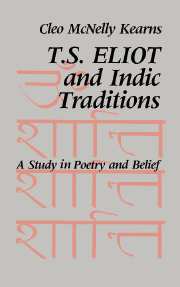6 - Literary influences
Published online by Cambridge University Press: 07 October 2011
Summary
To us, then at last the Orient comes …
The Originatress comes,
The nest of languages, the bequeather of poems, the race of eld,
Florid with blood, pensive, rapt with musings, hot with passion,
Sultry with perfume, with ample and flowing garments,
With sunburnt visage, with intense soul and glittering eyes,
The race of Brahma comes.
Walt WhitmanA philosophical theory which has entered into poetry is established, for its truth or falsity in one sense ceases to matter, and its truth in another sense is proved.
T. S. EliotELIOT APPROACHED Indic traditions not only through philosophy and religion but through literature as well. Two great heritages, European and American, combined to offer important precursors and a formidable poetic past to master. One of the paradoxes of this past was that, for Eliot, the major figures in the transmission of Indic influence – Goethe, Emerson, Whitman, and Yeats – were all poets about whom he, at first, had held serious reservations. He regarded them as large and capacious but suspiciously romantic and overextended, and opposed them, in his personal canon, to the metaphysical, witty, and ironic, though minor voices of, among others, Laforgue and Baudelaire. As Gregory Jay has effectively demonstrated in his extended study of Eliot's literary genealogy, this opposition was no doubt defensive (75).l Eliot admitted that many minor literary figures were vital to him, in part simply because they were minor (TCC 18) and thus did not overwhelm or unduly influence him, but provided useful models.
- Type
- Chapter
- Information
- T. S. Eliot and Indic TraditionsA Study in Poetry and Belief, pp. 160 - 192Publisher: Cambridge University PressPrint publication year: 1987



